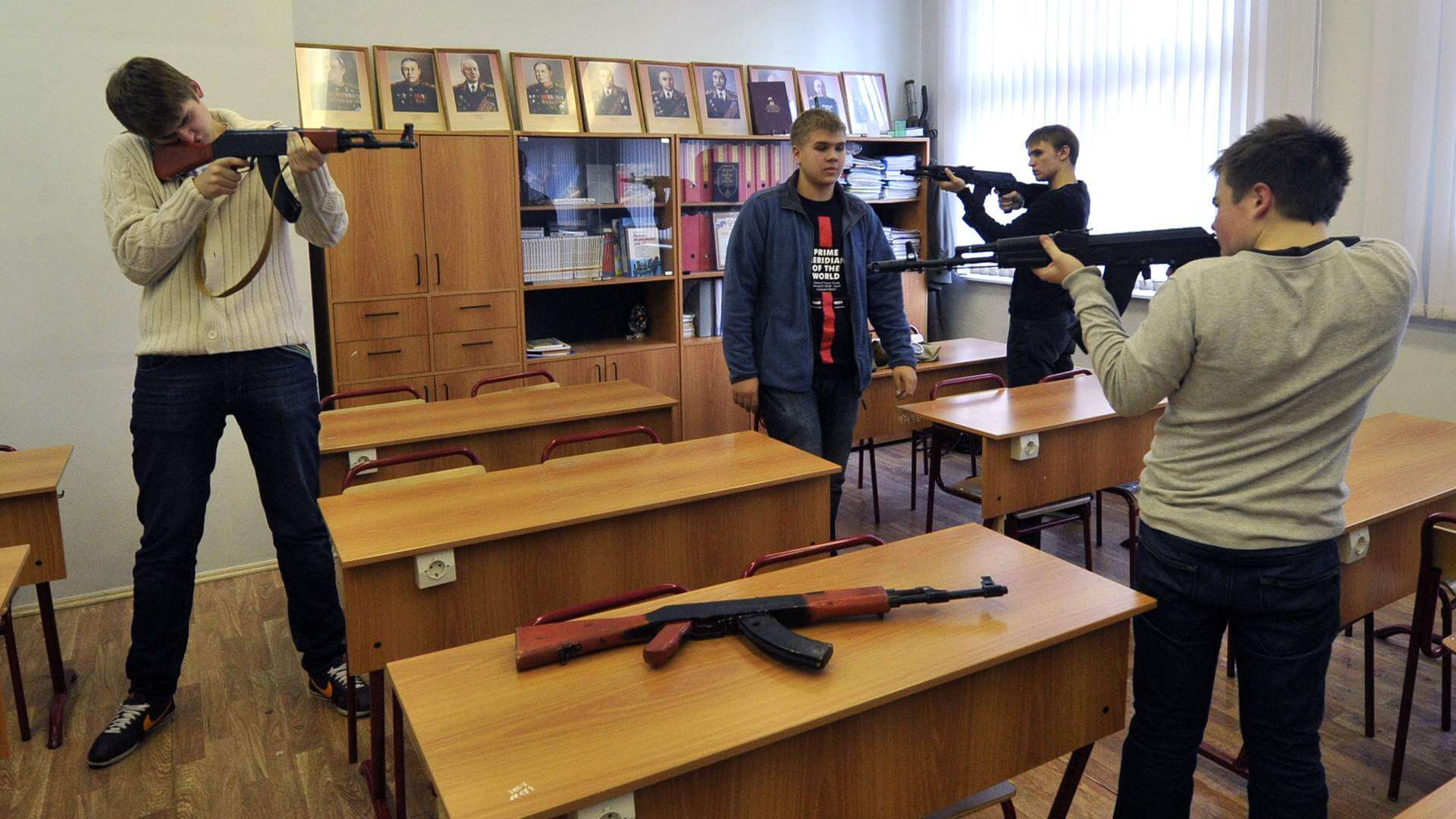On Sunday, in its daily intelligence update on the Ukraine war, the British Defence Intelligence claimed that Russia is planning to reintroduce Soviet-era military training in schools by September next year.
“Russian officials attempted to revive this training in 2014 following Russia’s invasion of Crimea. It was hoped that the initiative would improve the quality of conscripts. Eight years later, little has changed, and the quality of Russian conscripts remains poor, with low morale and limited training,” it said. The training includes “contingencies for a chemical or nuclear attack, first aid, and experience handling and firing Kalashnikov rifles.”
Latest Defence Intelligence update on the situation in Ukraine - 13 November 2022
— Ministry of Defence 🇬🇧 (@DefenceHQ) November 13, 2022
Find out more about the UK government's response: https://t.co/i6RDn08qwR
🇺🇦 #StandWithUkraine 🇺🇦 pic.twitter.com/I9h2dxhQpZ
It noted that Russian Education Minister Sergey Kravtsov mentioned last week that the curriculum is being drafted right now and will be finalised by the end of the year. Thereafter, an approvals process will take place. The report further stated that the Russian Defence Ministry supports the idea and announced that no more than 140 hours of military training per year should be allowed.
“This training likely intends to prepare students with military skills as they approach conscription age and to increase the take-up for mobilisation and conscription drives,” the report revealed, adding, “This initiative is also likely to be part of a wider project to instill an ideology of patriotism and trust in public institutions in the Russian population.”
Last week, A Just Russia party leader Sergei Mironov told pro-Kremlin media Izvestia, “Adding this subject would systematically prepare citizens for a possible confrontation with the enemy.” Deputy Defence Minister Valery Gerasimov has agreed that people with combat experience like former military veterans and law enforcement officials should teach these courses.
Similarly, deputy chairman of the United Russia party Adalbi Shkhagoshev stressed, “Of course, skills in any business are good. And in this case, I can say: if you want peace, prepare for war.”
Deputy speaker of the State Duma from the LDPR party Boris Chernyshov revealed that he was the one to propose this idea to Kravtsov in September, claiming that some post-Soviet countries, such as Armenia, Uzbekistan, and Ukraine, also have such a curriculum. “Unfortunately, we removed this from the educational standards with the collapse of the USSR, although this is a traditional school discipline that should not be scared,” he underscored.
Deputy Chief Of Russian Parliament "If you want peace,prepare for war"
— Jayess (@Sootradhar) November 13, 2022
Justifying re introduction of Soviet Era Military Training = Firing Assault Rifles etc for 10th and 11th grade students. https://t.co/UuuuQ6MBxr
However, teachers pointed out that students are already facing an overloaded schedule and therefore such training should be a part of already existing subjects like life safety. Russian schools have already included the Ukraine war in 10th and 11th graders’ history syllabus this year. Furthermore, younger students attend weekly patriotic classes called “Important Conversations.” This has been criticised by parents, teachers, and lawyers as a way to garner support for the war among children.
According to Russian state-owned daily Kommersant, the government is also planning to replace humanities with an ideological course called “Fundamentals and Principles of Russian Statehood” by March next year. It is part of the “DNA of Russia” project, which aims to outline Russian ideology around five main values: patriotism, trust in public institutions, social harmony, traditional families, and “personal creation.”
The head of the Department of Political Sciences at Saratov State University, Alexander Vilkov, who is part of the project, stressed that the new course aims to “arouse interest so that students can appreciate the significance of the Russian state and its functionality at different times. To understand why it is necessary to value and protect this most important institution.”
The new military training programme come against the backdrop of reports of new, ill-prepared conscripts being sent to the frontlines in Ukraine, where many have likely surrendered. Newly-mobilised Russian troops have complained that “two weeks of training doesn’t prepare” them for the heavy Ukrainian shelling. A Ukrainian attack earlier this month killed 440 conscripts out of 570. “We were completely exposed, we had no idea what to do,” an anonymous draftee remarked, while another Russian draftee Aleksei Agafonov claimed, “No one wants to go back.”
Russian schools will have a military training course starting from next year, - head of Russian ministry of education.
— Anton Gerashchenko (@Gerashchenko_en) November 11, 2022
Can you imagine a European school which teaches children to shoot and take care of Kalashnikovs?
It's time to stop Russia.
Similarly, pro-war journalist Anastasia Kashevarova asserted that untrained troops were being “thrown to the frontline.” “Some commanders on the ground should be shot. […] You told us that there would be training, that they would not be sent to the front lines in a week. Did you lie again?” she questioned.
Moreover, Russian President Vladimir Putin’s partial mobilization does not appear to have paid any dividends, with Ukraine claiming to have retaken Kherson. “Stabilisation and restoration of law and order in 226 settlements will be ensured in the Kherson region,” Ukrainian President Volodymyr Zelensky said during his nightly address on Sunday.

